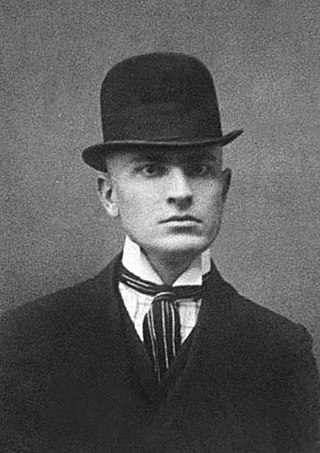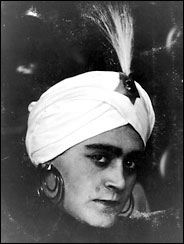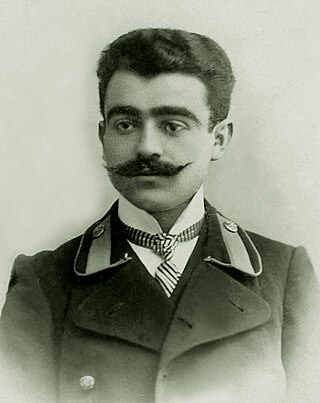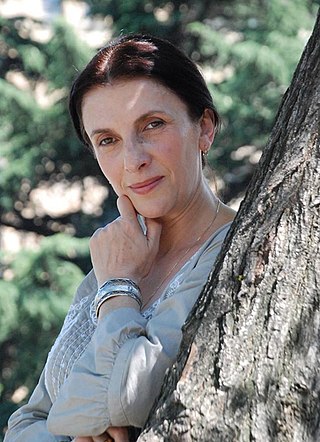
Tamar the Great reigned as the Queen of Georgia from 1184 to 1213, presiding over the apex of the Georgian Golden Age. A member of the Bagrationi dynasty, her position as the first woman to rule Georgia in her own right was emphasized by the title mepe ("king"), afforded to Tamar in the medieval Georgian sources.
The culture of Georgia has evolved over the country's long history, providing it with a unique national identity and a strong literary tradition based on the Georgian language and alphabet. This strong sense of national identity has helped to preserve Georgian distinctiveness despite repeated periods of foreign occupation.

Grigol Robakidze was a Georgian writer, publicist, and public figure primarily known for his prose and anti-Soviet émigré activities.

Lev Nussimbaum, who wrote under the pen names Essad Bey and Kurban Said, was a writer and journalist, born in Kiev to a Jewish family. He lived there and in Baku during his childhood before fleeing the Bolsheviks in 1920 at the age of 14. In 1922, while living in Germany, he obtained a certificate claiming that he had converted to Islam in the presence of the imam of the Turkish embassy in Berlin. He created a niche for himself in the competitive European literary world by writing about topics that Westerners, in general, knew little about - the Caucasus, the Russian Empire, the Bolshevik Revolution, newly discovered oil, and Islam. He wrote under the name of Essad Bey in German.
For articles related to Georgia, see Category:Georgia (country)

Ali and Nino is a novel about a romance between a Muslim Azerbaijani boy and Christian Georgian girl in Baku in the years 1918–1920. It explores the dilemmas created by "European" rule over an "Oriental" society and presents a tableau portrait of Azerbaijan's capital, Baku, during the Azerbaijan Democratic Republic period that preceded the long era of Soviet rule. It was published under the pseudonym Kurban Said. The novel has been published in more than 30 languages, with more than 100 editions or reprints. The book was first published in Vienna in German in 1937, by E.P. Tal Verlag. It is widely regarded as a literary masterpiece and since its rediscovery and global circulation, which began in 1970, it is commonly considered the national novel of Azerbaijan. The English translation, by Jenia Graman, was published in 1970.

Princess Nino Chavchavadze was a daughter of the famous Georgian knyaz (prince) and poet Alexander Chavchavadze and wife of Russian diplomat and playwright Alexander Griboyedov.
Azerbaijan International is a magazine that discusses issues related to Azerbaijanis around the world. It was established in 1993 shortly after the dissolution of the Soviet Union when Azerbaijan gained its independence. Since then, it has been published quarterly in English with occasional articles in the Azerbaijani language in Latin and Arabic scripts. The magazine has offices in Los Angeles and Baku.

Yusif Vazir Chamanzaminli, also spelled Chemenzeminli, born Yusif Mirbaba oghlu Vazirov was an Azerbaijani statesman and writer known for his novels, short stories, essays, and diaries. Evidence points to the fact that Chamanzaminli was the primary core author of the famous romance novel Ali and Nino first published in 1937 in Austria under the pen-name of Kurban Said.

Lasha Bugadze is a Georgian novelist and playwright. Among his noteworthy plays are Shocked Tatyana, which satirizes war heroism, and Soldier, Love, Bodyguard and ... the President.
Tsisperqantselebi was a group of Georgian Symbolist poets and prose-writers which dominated the Georgian literature in the 1920s. It was founded as a coterie of young talented writers in the Kutaisi city in 1915 and was suppressed under the Soviet rule early in the 1930s.

Nino was a Georgian princess royal (batonishvili) as a daughter of King George XII of Georgia and princess consort of Mingrelia as the wife of Grigol Dadiani, Sovereign Prince of Mingrelia. After the death of her husband in 1804, Nino was a regent for her underage son, Levan until 1811, and helped bring Mingrelia and Abkhazia, a neighboring principality of her in-laws, under the hegemony of the Russian Empire. In 1811, she retired to Saint Petersburg, where she died at the age of 75.

Beka Kurkhuli - is a modern Georgian writer and military reporter.

Irma Ratiani is a literary theoretician and translator, Doctor of Philological Sciences (2003), Professor (2004) at the Tbilisi State University, Head of the Department of General and Comparative Literary Studies; Director of the research center - Shota Rustaveli Institute of Georgian Literature; Editor in Chief of Annual Scientific Journal of Literry Theory and Comparative Literature published in Georgia - Sjani (Thoughts);Member of the EC of International Comparative Literature Association (ICLA).
Katsia II Dadiani, of the House of Dadiani, was Prince of Mingrelia from 1758 to 1788. His rule was dominated by complicated relations with the Kingdom of Imereti, which claimed suzerainty over all of western Georgia. In efforts to further his precarious sovereignty, Dadiani easily switched sides, allying himself, alternatively, with the Imeretians, Russians, and Ottomans, as exemplified by his vacillating position during the Russo-Turkish War (1768–1774).

Mariam Tsiklauri is a Georgian poet, children's author and translator.

Zaza Okuashvili, is a UK Citizen and businessman. Founder and owner of the Omega Group of companies and the national television station, Iberia. He has the Reserve military rank of Major.
Akaki Bakradze was a Georgian writer, literary critic, art historian, and public figure, who published widely on diverse issues. Among other prominent posts, Bakradze was director of the Rustaveli Theatre from 1973–1980, and in 1988 was appointed artistic director of the Marjanishvili Theatre.

Rostom Chkheidze is a Georgian author, academician and politician who has served in the Parliament of Georgia since 2020.













